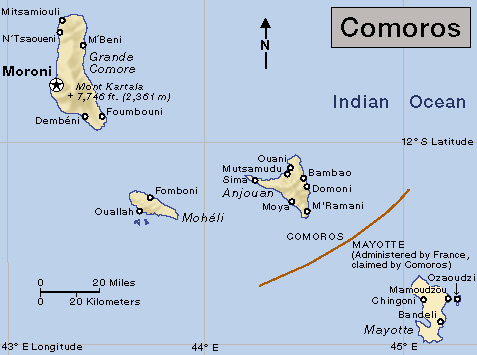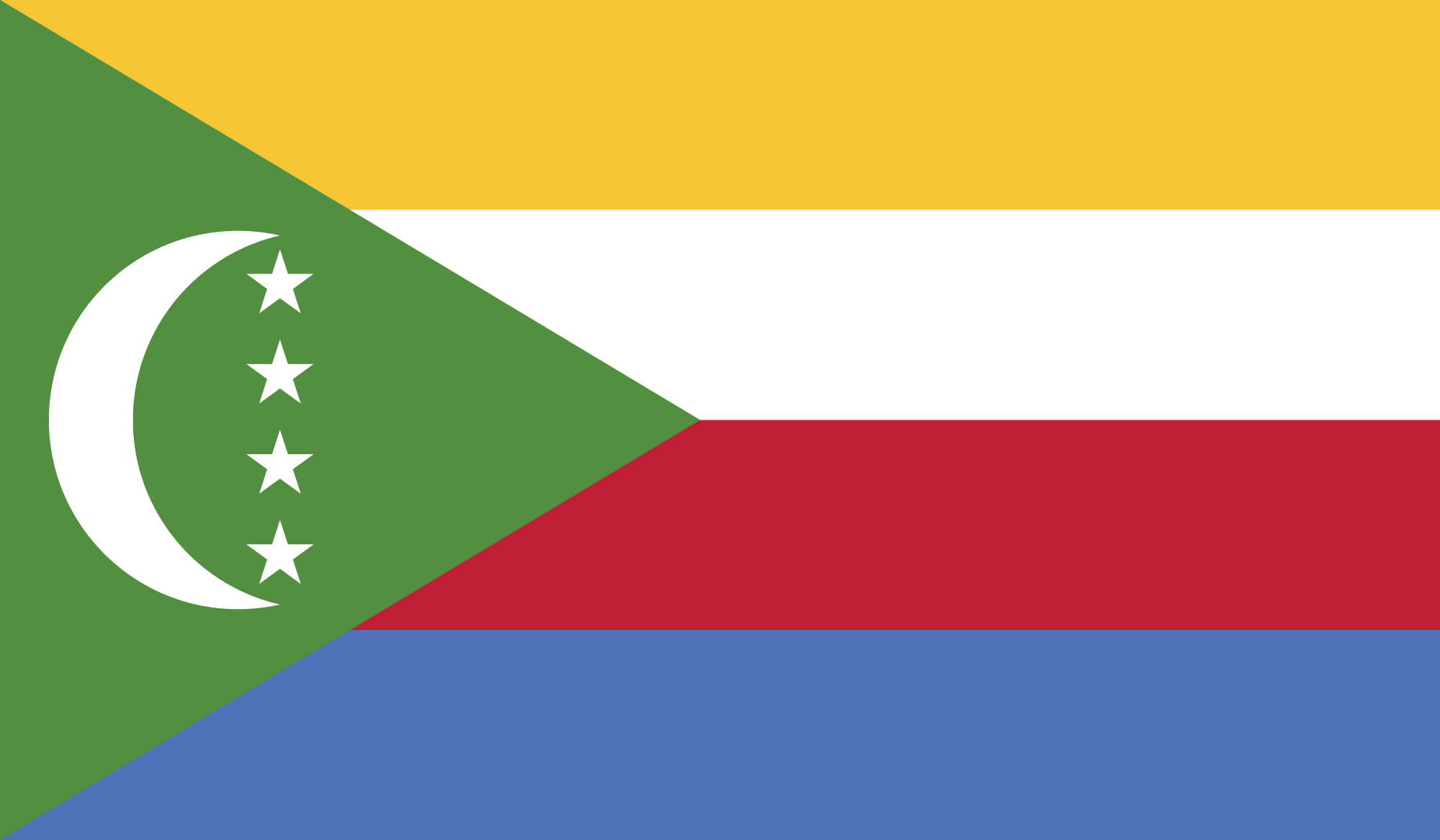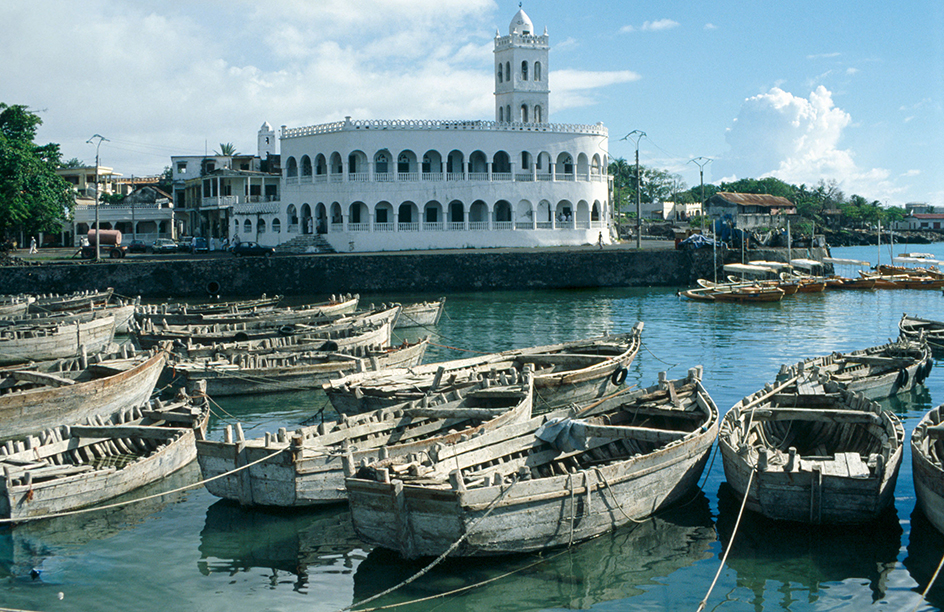Comoros << KOM uh `rohz` or kuh MAWR ohz >> is an archipelago (group of islands) in the Indian Ocean between the mainland of Africa and the island country of Madagascar. Comoros consists of three main islands—Anjouan, Grande Comore, and Mohéli—and several smaller islands. All the islands belonged to France until 1975. The Comoran government also considers the island of Mayotte part of the country, but the people of Mayotte have voted to remain a French possession.

The country’s official name is Union of the Comoros. The islands, excluding Mayotte, have an area of 719 square miles (1,862 square kilometers). Mayotte has an area of 142 square miles (368 square kilometers). Moroni, on Grande Comore, is the capital and largest city.
Government.
Comoros is a republic with a president and a unicameral (one-house) legislature called the Assembly of the Union. The president, who is both the head of state and the head of government, is elected by the people to a five-year term. The president may serve up to two terms. The president appoints a cabinet called the Council of Ministers. The Assembly of the Union consists of 24 members, elected by the people to five-year terms. The country’s highest court, the Supreme Court, has seven judges.

People.
Most Comorans have mixed ancestry. They are descendants of Arabs, Africans, and others. About four-fifths of workers have jobs related to farming. But Comoros has a shortage of good farmland, and it must import much of its food. The chief food is rice. Most rice is imported. Other foods include bananas, cassava, coconuts, and fish. Major problems include poverty, disease, illness, hunger, and malnutrition. The nation has a shortage of physicians and hospitals. These problems contribute to a high death rate, especially among children. Most Comorans are Muslims. Most people speak the Comorian language, which is one of the official languages, along with Arabic and French.

Land and climate.
Most of the Comoro Islands were formed by volcanoes. Mont Kartala, a volcano on Grande Comore, is still active. Plateaus and valleys lie below the volcanic peaks. Mangrove swamps form the shorelines of almost all the islands. Some of the islands have dense forests. However, much forestland has been cleared for farming. Such clearing has resulted in severe soil erosion on most of the islands.
Comoros has a cool, dry climate from May through October. A hot, rainy season lasts from November through April. Heavy rains during this period provide the islands with their only natural source of drinking water. The people store the water for year-round use.
Economy.
Comoros is one of the world’s poorest nations. It has no major industry, and no valuable minerals have been found there. Comoros receives large amounts of financial aid from European and Arab countries. The country’s economy is primarily based on agriculture. Agriculture employs about four-fifths of Comoros’s labor force. The people raise such food crops as bananas, cassava, coconuts, and rice. They export cloves, copra (coconut meat), vanilla, and perfume oils from such plants as ylang-ylang trees. Comoros imports much of its food. Money spent on imports greatly exceeds earnings from exports. Comoros has an international airport on Grande Comore.
History.
The first people to live in the Comoro Islands came from the African mainland, Madagascar, and Malaysia. Historians know little about them or when they came to the islands. In the 1400’s, Arabs landed on the Comoros and took them over. For the next 400 years, Arab sultans ruled each island as a separate kingdom.
France seized Mayotte in 1843 and by 1886 had gained control of the rest of the islands. The French granted the Comoro Islands self-rule in 1961.
In 1974, Anjouan, Grande Comore, and Mohéli voted for independence, but Mayotte voted to remain under French control. France recognized the independence of the three islands but rules Mayotte as a possession. In 1976, the people of Mayotte again voted for French rule.
Several Comoran governments held power for short periods after independence was declared. There have been a number of successful and unsuccessful coup attempts against the elected governments of Comoros. In 1997, separatists on Anjouan declared independence and set up an island government. Mohéli separatists also declared independence. Each group claimed the central government had neglected its island’s political and economic needs.
In April 1999, Grande Comore and Mohéli agreed to a peace plan designed to keep the islands unified but give each island greater autonomy. Anjouan did not agree to the plan. Later that month, military leaders led by Azali Assoumani overthrew Comoros’s elected government.
In 2001, voters approved a new constitution designed to give greater autonomy to the three main islands of Comoros. In 2002, all three islands ratified the national constitution, approved their own local constitutions, and elected their own presidents. That same year, Azali Assoumani was elected national president of Comoros. In 2006, Ahmed Abdallah Mohamed Sambi, from the island of Anjouan, was elected president.
In June 2007, Mohamed Bacar refused to step down as president of Anjouan at the end of his term. He was inaugurated as Anjouan’s president after elections later that month. The Comoran government refused to recognize his presidency. In February 2008, the African Union (AU) sent troops to the nearby island of Moroni to support the Comoran government. In March, AU and Comoran troops invaded Anjouan, gaining control of the island. Bacar fled to Mayotte to seek political asylum from the French government. In April, the French government flew him to the island of Réunion, where he was placed under house arrest.
In 2010, voters elected Vice President Ikililou Dhoinine, from the island of Mohéli, to succeed Sambi as national president of Comoros. Dhoinine took office in 2011. In 2016, voters again elected Azali Assoumani to the presidency. In 2018, the Constitution of Comoros was changed to allow the president to serve two five-year terms. Assoumani won another term as president in a disputed election held in 2019. In 2022, former president Sambi was convicted of corruption and sentenced to life in prison. In 2024, Assoumani won a fourth term as president in a disputed election marked by low voter participation.
